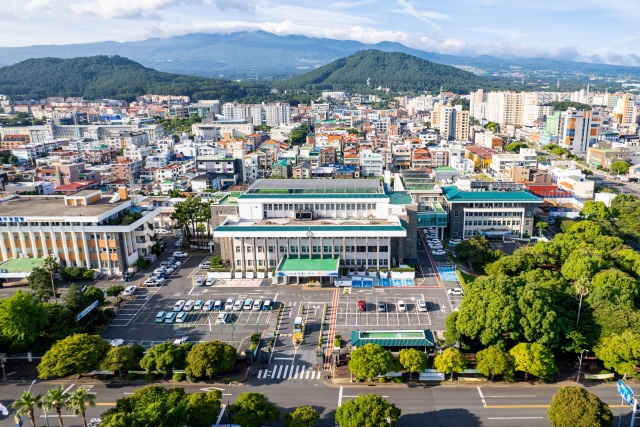|
Jeju Special Self-Governing Province released 'Things Change Like This in 2023’ that contains useful information for resident life and new policies, etc., for 2023 on its website. Details are available by downloading the e-book on the Jeju Provincial Office website (https://www.jeju.go.kr/news/online/ebook.htm).
| |
 |
|
| |
There are a total of 68 systems and policies across nine sectors that will change next year in △general administration △public economy invigoration △youth support △future industry △health/welfare/safety △primary industries △housing/transportation △environmental conservation △culture/tourism/sports.
■ In the general administration sector, the ‘Hometown Love Donation Program’, where you can donate up to 5 million KRW per year to a local government organization outside of your current address will be implemented.
With the revision of the Enforcement Decree of the Special Act on Discovering the Truth on the Jeju 4.3 Uprising and the Restoration of Honor of Victims, plans are to additionally receive the 8th 4.3 victims and surviving family reports from January, and applications for second and third compensation for the 4.3 victims will be reviewed and paid out by the Jeju 4.3 Committee.
Jeju-style lifelong education vouchers are being operated for the first time among provincial government organizations, and learning voucher cards worth 350,000 KRW per person are provided to national basic livelihood recipients and low-income families, one-parent families, etc.
■ In the public economy invigoration sector, the 2023 livelihood wages will be increased from 10,660 KRW to 11,075 KRW for public institutes, and the Jeju private-government cooperative delivery app ‘Mukkebi’ that was implemented to lower delivery app fees for small business owners will be operated in earnest at cheap fees of 1.5%.
| |
 |
|
| Delivery app ‘Mukkebi’ |
For SMEs and small businesses in Jeju, secondary supplementation of the SME fostering fund will be temporarily expanded and applied at a low nominal interest rate of 1.4%, and reimbursement maturation and holding period for existing business stabilization support funds will also be extended for one more year.
■ In the youth support sector, a youth sovereignty conference will be established for directly proposing youth policies, and youth autonomous budget projects that are slated for pilot operation will also be reviewed as part of the plans to realize youth sovereignty in earnest.
An online platform will be constructed to check out the scattered youth policies at a glance, and fact-finding surveys will be held to provide practical support for youths who are socially alienated.
Independence settlement funds and independence allowances to help youths preparing to become independent by leaving children welfare facilities or whose foster care will end will also be increased.
* (Independence settlement funds) 5 million KRW per person → 15 million KRW, (independence allowance) 350,000 KRW → 400,000 KRW per month
■ In the future industry sector, efforts to become a global green hydrogen hub city will continue by operating carbon-free hydrogen charging stations and hydrogen buses (9 buses) by utilizing the abundant renewable energy of Jeju.
| |
 |
|
| Hydrogen charging station |
Discovery and testing of various drone services are ongoing through the continued operation of the Drone Special Area and policies for commercializing urban air mobility (UAM) and promoting the future mobility industry of Jeju will keep going.
Efforts will be made to establish a basis as a hub city for the private-sector space economy by announcing the basic plans for fostering the space industry utilizing Jeju’s geographical strengths.
■ In the health/welfare/safety sector, the distribution expiration system will be changed to a consumption expiration system, and the air ambulance will be in full operation to provide prompt first-aid and transport services for critical emergency patients in island and mountain regions.
Social welfare personnel will be reinforced and customized welfare teams will be expanded for administrative regions such as eup, myeon, and dong to provide integrated welfare services for all residents of the island.
As the median income for determining basic livelihood recipients was increased by 5.47%, the base amount per salary was also raised to provide more reliable support. Furthermore, eligibility for support of low-income families in times of crisis was also expanded from 80% or less of the median income to 100% or less.
Prices for supporting meals for hungry children and low-income senior citizens will be raised, and cultural activity expenses and emotional education support expenses for children in care facilities such as children’s welfare facilities will also be increased.
* (Hungry children meals) 7,000 KRW → 8,000 KRW (low-income senior citizen meals) 4,500 KRW → 5,500 KRW
* (Cultural activity expenses) elementary/middle/high school, 20,000, 30,000, 40,000 KRW → 30,000, 50,000, 70,000 KRW (emotional education support expenses) 80,000 KRW → 200,000 KRW per person/year
❍ The resident safety insurance with a maximum of 20 million KRW will be adjusted in terms of covered items and compensation ceiling so that residents can actually feel its benefits.
■ In the primary industries sector, eligibility for farmer allowances and fisher allowances were partially eased, and for farmer allowances, farmers who have a history of subscribing to national health insurance as an employee of a company will also be included for payments, and fishers who subscribed to national health insurance as an employee of a fishing business can also receive fisher allowances.
As the free support period for the petl registration program was extended to 2024, animal registration chips are supported and can be registered free of charge, and areas subject to the neutering support project for dogs raised outdoors will also be expanded to eups, myeons, and dongs.
■ In the housing/transportation sector, up to 400,000 KRW can be subsidized for moving costs (moving expenses, household item purchasing costs) for residentially vulnerable classes living in semi-basement rooms, containers, plastic greenhouses, etc. and the housing allowance program (lease, repairs, maintenance) will also be expanded to support those in the 47% of median income.
Families that do not own homes and gave birth (adopted) to a second or more child will also receive home lease expenses of 2.8 million KRW a year (14 million KRW over 5 years) to help them build up residential independence.
As the operations and management business of the Jeju transportation welfare card was changed, senior citizens over 70, registered disabled persons, and people of national merit must visit a Nonghyup branch to receive a new card.
For senior citizens, the public (elderly) happy taxi service will be changed from the system of giving 24 rides a year to giving 168,000 KRW in taxi credit that will be deducted with each ride.
* (Past) 7,000 KRW per time, 24 times a year → (Changed) 15,000 KRW per time, twice a day, 168,000 KRW per year
The EV charging rates will also be increased from 290KRW per kWh to 320 KRW (50kw) and 340 KRW (100kw or higher).
■ In the environmental conservation sector, water utilities will rise by 5% and sewage by 20%, and thus, the home water utilities will rise from 490KRW to 510KRW per ton and sewage fees from 500 KRW to 600 KRW per ton.
With the enactment of the reducing disposal product usage campaign for the entire island, use of disposable products must be prohibited, free provision of such disposables must be prohibited, and other rules must be followed corresponding to each facility or business type. Violation of this can result in fines of up to 3 million KRW.
■ In the culture/tourism/sports sector, support for fostering Jeju artists and to help them collaborate with artists outside of Jeju in creative works will be made available, such as provision of residency workspaces in the capital area and renting exhibition areas in Seoul and providing them free of charge.
Digital transformation support projects such as construction websites to strengthen the competitiveness of the travel industry will be carried out and support on customized marketing for the tourism industry, such as marketing to group tourists, production of PR videos, etc. will be provided.
A new commentator fostering and training course is being operated and the commentator license will be given after completing the education and on-the-job training for three months.
The amount of sports lessons vouchers to subsidize fees for taking sports classes will also be raised from 85,000 KRW per month to 95,000 KRW per month, and the support period will be expanded from 10 months to 12 months. |






















